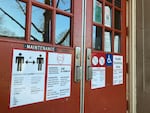In Portland Public Schools’ adopted budget for this school year, continuing the Online Learning Academy was highlighted as one of the district’s efforts to “increase learning opportunities for every student.”
The state’s largest district opened the Online Learning Academy, or OLA, in 2021 to serve students in kindergarten through twelfth grade who wanted to continue school online. Some families flocked to the program for health reasons as most students in Oregon were returning to in-person school full-time during the pandemic.

FILE: Signs promote safety precautions to limit the spread of COVID-19 at Sabin Elementary School in January 2021. As thousands of students returned to schools across Oregon, many families with health concerns opted to have their children continuing to learn online.
Rob Manning / OPB
Sara Kemper saw OLA as a safe school option for her two children in part because their household included an immunocompromised family member. She also saw the online program as a potential improvement for her daughter, who receives special education services. After years of struggling to find the right fit within the district’s schools and programs, Kemper’s daughter thrived in the virtual environment.
“We didn’t know that it was going to meet all of my child’s ‘sped’ [special education] needs,” Kemper said.
Kemper’s daughter is in middle school and is considered “twice exceptional,” a term for students who qualify as talented and gifted and have a learning disability. Kemper’s daughter has autism and ADHD.
Kemper said the accommodations required under her daughter’s individualized education plan weren’t necessary and mostly “fell away” in the online environment.
“She’s seen by her teachers in a new way. They really are able to meet her learning needs,” Kemper said of OLA.
“She doesn’t have to have earphones, she doesn’t have to have timeouts, she’s not clearing classrooms — this is a child that would throw desks when activated and upset. She’s not suicidal,” Kemper said. “There’s so many things that are being fulfilled for her academically and socially here that cannot be met in an in-person environment.”
Tuesday evening, Kemper received a text that the program was closing at the end of this school year. After two years she described as “peaceful,” she felt blindsided by the loss of a “huge resource”.
“This was a gem, and I don’t even know what else is out there,” she said.
Related: Students with disabilities face academic setbacks and safety risks in Oregon schools
District officials cited low enrollment and budget difficulties in ending the program, a decision made by executive leadership. In an interview with OPB, district officials said the program was a temporary one and that in a challenging budget environment, the district has to make tough calls.
“We are making the difficult decisions that will sustain us in the long-term,” PPS chief of staff Jonathan Garcia said.
District leaders say the online program was funded with temporary federal dollars that schools have to spend by September 2024.
“It was a short-term program that was only opened a couple of years ago for a specific purpose,” said Cheryl Proctor, PPS’ deputy superintendent of instruction and school communities.
District officials opened the Online Learning Academy for “students who could not attend in-person due to health reasons.”
Garcia admitted the district did not use the term “short-term” to describe the program.
“Was the word ‘short-term’ used? I don’t think so,” Garcia said. “Could we have been clearer? Probably.”
District officials also cited “low participation” and high cost as reasons for the closure.

FILE: Portland Public Schools district headquarters, Portland, Ore., Dec. 15, 2018.
Bradley W. Parks / OPB
According to the district’s proposed budget for 2022-23, OLA’s budget was almost $5 million — about $12,186 per student. Only 18 of the district’s more than 80 schools have a higher per-student cost than the online program.
Demographic data in that document for the 2021-22 school year shows a student population that included 21% students with disabilities, 15% Black students and 20% Latino students.
Currently, 236 students attend, an increase of 11 students from October enrollment reports.
Proctor said the district will sit down with each OLA family to discuss options for next year, including the district’s other virtual offerings. Those options include Virtual Scholars and Evening Scholars, programs typically offered to students in high school. At this time, the district doesn’t have any elementary or middle school virtual options other than OLA.
As recently as this winter, PPS director of special education Michelle Murer mentioned OLA as an option for serving students with disabilities in a system where students and families are struggling to get what they need.
Proctor said there will be options for OLA students receiving special education services.
“We are ensuring that we are having conversations with every family, including our students with disabilities, and ensuring that every option that we have available to meet their needs within PPS and within our programming, we will … make those programs available according to what is in the [individualized education plan],” Proctor said.
Proctor and Garcia did not specify when families would be contacted for those conversations.
Related: Families of Oregon students with disabilities search for solutions
Kemper said if she would’ve known her children’s schooling method was in danger of closing, she would’ve advocated. She’s done it before, when Portland was moving ACCESS, an alternative program for talented and gifted students.
“Why weren’t we told anything before? Why wasn’t there a board meeting? I would’ve shown up,” she said.
Because the program is not technically a “school,” district officials said the move to close it did not trigger the district’s school closure policy, which requires a public process involving the school board and the superintendent.
Kemper said she’s looking into other online virtual schools.
“We cannot and will not go back to in-person,” she said.
This is one of the first decisions made as the district prepares to present a budget for next school year to the school board at the end of April. District officials have announced other financial steps they’re planning to take, including a freeze on hiring at the central office.